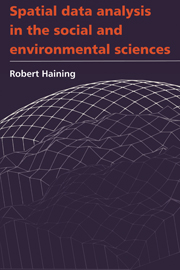Book contents
- Frontmatter
- Contents
- List of tables and displays
- Preface
- Acknowledgements
- PART A Introduction to issues in the analysis of spatially referenced data
- 1 Introduction
- 2 Issues in analysing spatial data
- PART B Parametric models for spatial variation
- PART C Spatial data collection and preliminary analysis
- PART D Modelling spatial data
- Postscript
- Glossary
- References
- Index
2 - Issues in analysing spatial data
Published online by Cambridge University Press: 05 August 2012
- Frontmatter
- Contents
- List of tables and displays
- Preface
- Acknowledgements
- PART A Introduction to issues in the analysis of spatially referenced data
- 1 Introduction
- 2 Issues in analysing spatial data
- PART B Parametric models for spatial variation
- PART C Spatial data collection and preliminary analysis
- PART D Modelling spatial data
- Postscript
- Glossary
- References
- Index
Summary
This chapter considers problems arising in handling and analysing spatial data. The first section deals with the nature of spatial data, the sources and quality of such data with particular reference to the ‘new’ data sources and the problems they may create for analysis. Subsequently, we discuss forms of spatial data and the problems of computerised spatial data storage. The second section examines why the spatial referencing of data is important in the social and environmental sciences and how spatial structure in data comes about. This leads to a discussion of the types of problems that are addressed and for which methods of data analysis are required. The third section is concerned explicitly with the distinctive problems of spatial data analysis. These are problems associated with the observed values, their spatial configuration and the areal system across which the values are observed.
The final section describes a framework for data analysis which summarises the issues of the first two chapters. Exploratory and confirmatory data analysis provide a framework for statistical analysis (Table 2.1). These two elements are concerned with the identification of structure in general data sets and the development of models for such data. The table distinguishes different approaches to confirmatory data analysis. If strict distributional assumptions are known to hold, parametric methods are very efficient (estimators have small sampling variances and hypothesis tests have high power), but otherwise they may be subject to serious error.
- Type
- Chapter
- Information
- Publisher: Cambridge University PressPrint publication year: 1990

